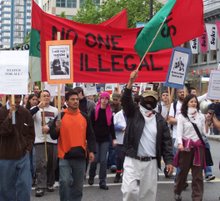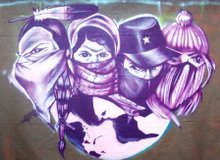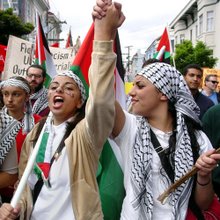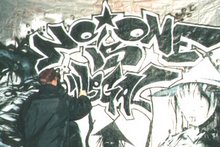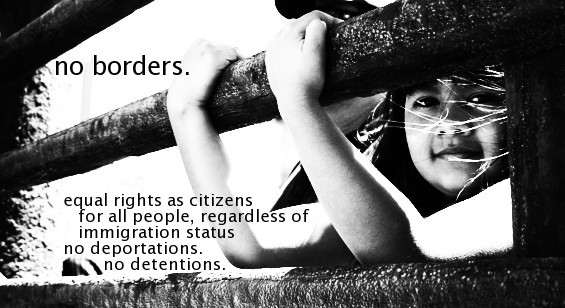 January 12th Vancouver Action in Solidarity with the Security Certificate Detainees
January 12th Vancouver Action in Solidarity with the Security Certificate Detainees
To see images of the Vancouver action, please visit:
http://www.flickr.com/photos/noiivancouver/
To see brief video clips of the Vancouver action, please visit:
http://video.google.ca/videosearch?q=no+one+is+illegal+vancouver
To read the Open Letter from Gitmo North as well as how to take action, please visit:
http://www.homesnotbombs.ca/openletter.htm
On January 12th, about 30 people – event organizers from No One Is Illegal Vancouver and allies from various communities – gathered to join the national days of action (January 11th to 15th) demanding an end to Security Certificates in solidarity with the Security Certificate detainees, their families and supporters across the country. The other demands of the action were an immediate closure of the Kingston Immigration Holding Centre (KIHC) – also known as Guantanamo North, an immediate release of Canada’s secret trial “Security Certificate” detainees or at the very least provision of a fair, transparent and open trial to them, an end to all deportation proceedings of the Secret Trial Five, an end to deportation to torture and an immediate condemnation of the illegal prison at Guantanamo Bay in Cuba.
The action came in the wake of a weeks long hunger strike being carried out by Mahmoud Jaballah (currently at 41 days of his hunger strike), Mohammad Mahjoub (52 days) and Hassan Almrei (41 days) at KIHC, a $3.2 million six-cell detention block that was created especially for security certificate detainees by the Canadian Border Services Agency (CBSA) within the maximum security prison, Millhaven Penitentiary. The men were moved to the prison in Bath, Ontario, even farther from their families, in April 2006. Their daily lives at KIHC have been marked by psychological torture, insecure conditions and lack of medical care. The demands of their current weeks-long liquid-only hunger strike, which is their second since the move to Millhaven, are simple ones as they explained in an Open Letter to the Canadian public released January 8th. They include the request of a supervisor to be present when they are moved within the facility for their own security, the delivery of medical care in their living unit as was done previously if there is no supervisor to accompany them to the other building, the ability to meet with media without the presence of guards, an end to humiliating daily head counts given there are only three men, the ability to use affordable calling cards to call family overseas, and the same rights as other federal inmates (including access to a library and monthly three day trailer visits with their families).
The action took place a day after the fifth anniversary of the official opening of Guantanamo Bay, at the Vancouver Art Gallery, and consisted of a combination of projections onto the Gallery wall, information given out to about 400 passersby and street theatre. Five organizers symbolized the Secret Trial Five (Hassan Almrei, Adil Charkaoui, Mohamed Harkat, Mahmoud Jaballah and Mohammad Mahjoub) by dressing in the orange jumpsuits which have been seen in actions across the world in the past weeks, grimly symbolizing the detainees at the U.S. torture camp in Guantanamo Bay, Cuba. Those representing detainees kneeled in silence, with legs shackled together, heads covered by black cloths – catching the attention of those walking and driving by. Eventually the action was opened by acknowledging and honoring the Occupied Coast Salish Territories and remembering the detainees in Guantanamo Bay and the Security Certificate detainees in Canada. Each of the five detainees then read out statements to bring forth the stories of each of the Secret Trial Five as well as the inhumane process of Security Certificates; the words of the men’s open letter were also shared. Event organizers equally condemned the way the self-serving War on Terror has criminalized immigrants and refugees in Canada, not only through Security Certificates, but an array of racist immigration and security policies and intensified racial profiling. Many passersby expressed surprise and dismay at the fact that indefinite detentions and secret trial processes are ongoing in Canada – destroying the oft held myth of the “more humane” Canadian immigration and security complex.
The men at Millhaven have been detained under Security Certificates for as long as upwards of 6.5 years. The other two, Adil Charkaoui and Mohamed Harkat, have been released on bail under deplorable conditions including a state of virtual house arrest. All five men were arrested under "Security Certificates," a measure of the Immigration and Refugee Protection Act (IRPA) that has been described by Amnesty International as "fundamentally flawed and unfair". Security certificates and secret evidence reverse the fundamental rule of innocent until proven guilty. Neither the detainee nor his lawyer are informed of the precise allegations or provided with the full information against him. They are imprisoned indefinitely without charges on secret evidence and face deportation to their countries of origin, even if there is a substantial risk of torture or death. The Certificates can only be used against refugees and permanent residents – highlighting how lack of citizenship has been used to strip particular individuals and communities of basic and fundamental rights.
Other actions have taken place in at least Kelowna, Kingston, St. John’s, Halifax, Fredericton, Toronto, Montreal, London, Kitchener, and Winnipeg. More solidarity events will be happening across the country in upcoming weeks.
As of Friday, January 19th, the three men continue on with their hunger strike, 56 days, 45 days, and 45 days and are facing grave medical consequences.






